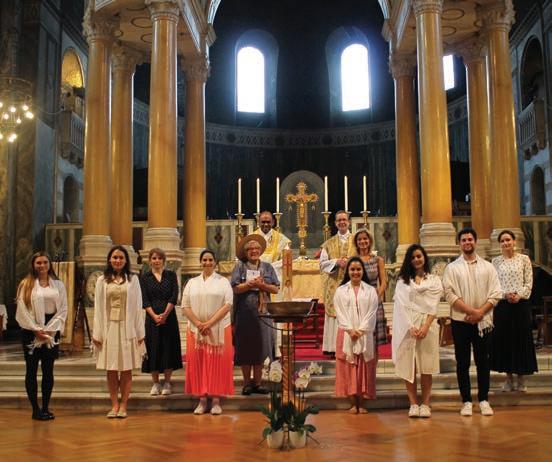
3 minute read
Catholic Education in Wales under Threat
Catholic Education Imperilled
This story concerns the provisions for Religious Education in Wales, not England, but what happens there will be closely watched here. Our Bishops’ Conference, of course, covers both countries and so we have a duty to support our fellow Catholics in Wales, and not least Archbishop George Stack of Cardiff, former Cathedral Administrator and Auxiliary Bishop of Westminster.
The Catholic Education Service has made it clear to the Welsh Government that they risk 'losing the trust of the Catholic community' in Wales if they continue with their planned changes to Religious Education in Catholic schools. Angela Keller, CES Wales Adviser, made these comments while giving evidence to the Senedd's Children, Young People and Education Committee as it scrutinises the Curriculum and Assessment (Wales) Bill.
The Bill has caused alarm among Catholic educators because it penalises Catholic schools, placing additional and unreasonable legal requirements on them that no other schools have to satisfy, specifically forcing them to teach an additional (and secular) RE curriculum. The proposed legislation seeks to change the name of RE to ‘Religion Values and Ethics’, something that all those on the evidence panel (which included representatives from the Church in Wales, the RE teaching profession and local government) strongly disagreed with.
In their evidence, the CES highlighted a 'lack of trust' between the Welsh Government and Catholic schools, with the Bill giving the distinct impression to the Catholic community that these changes were needed because something was wrong with Catholic RE in the first place. The CES also echoed the concerns of all 84 Catholic headteachers in Wales, who wrote a joint letter to the First Minister highlighting the damaging impact that these proposals would have on Catholic schools. The evidence session provided the opportunity for the CES to make the case for parents as the primary educators of their children (a concept frequently and forcefully propounded by Pope St John Paul II) and to insist that the Catholic community would resist the Bill's proposals to remove parents' right of withdrawal from both RE and Relationship and Sex Education. The extreme unfairness of the new proposals, that would allow a non-Catholic parent the right to demand secular RE for their child in a Catholic school, but would not allow a Catholic parent the right to ask for Catholic RE to be given to their child in a secular school, were also pointed out.
After the evidence session (which took place on Thursday 15 October) CES Wales Adviser Angela Keller commented: ‘Everyone giving evidence represented either a State partner or a member of the RE profession, and each one of us said the Welsh Government was going in the wrong direction. It's hurtful that the Welsh Government appears to see Catholic schools as the problem because we teach Catholic RE. It needs to start trusting Catholic schools and the professionals who work extremely hard in them’.
The Catholic Church is Wales comprises of three dioceses; Wrexham, Menevia and the Archdiocese of Cardiff. Collectively they have an estimated Catholic population of over 200,000 people. There are 84 Catholic schools in Wales, all of which are Voluntary Aided, educating almost 28,000 pupils and employing more than 1,500 teachers. 54% of pupils in these schools are Catholic.
On 5 May 2020, the Welsh Government opened its 'Curriculum for Wales: Religion, values and ethics' consultation. Many teachers and leaders in Catholic schools across Wales responded in opposition to the changes, viewing them as an assault on parental rights and on the academic rigour of Religious Education in Catholic schools. According to the Welsh Government's own consultation analysis, opposition to its proposals came from across the whole sector. Despite fervent opposition the Welsh Government has moved to introduce these changes to rename Religious Education to ‘Religion, Values and Ethics’ in the new curriculum.











